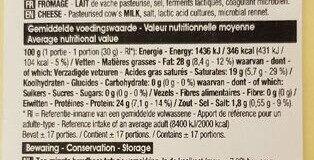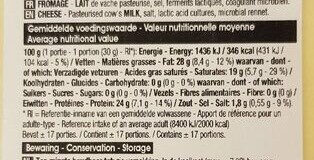Gouda jeune en tranches - Everyday - 500 g
This product page is not complete. You can help to complete it by editing it and adding more data from the photos we have, or by taking more photos using the app for Android or iPhone/iPad. Thank you!
×
Barcode: 5400141298604 (EAN / EAN-13)
Quantity: 500 g
Packaging: Plastic
Brands: Everyday
Categories: Dairies, Fermented foods, Fermented milk products, Cheeses, Cow cheeses, Uncooked pressed cheeses, Cheeses of the Netherlands, Gouda, Young Goudas
Labels, certifications, awards:
Green Dot
Traceability code: BE CO 105 EC
Stores: Colruyt
Countries where sold: Belgium, United States
Matching with your preferences
Environment
Carbon footprint
Packaging
Transportation
Report a problem
Data sources
Product added on by kiliweb
Last edit of product page on by inf.
Product page also edited by aiacciu, ecoscore-impact-estimator, foodvisor, openfoodfacts-contributors, ourlaem, packbot, roboto-app, sachab, thefilou, wolfgang8741, yuka.YmJnRERJa3RqZlUzaGNVUi9BcjE5WWh0d3FPeVluT1hFTW80SUE9PQ.










